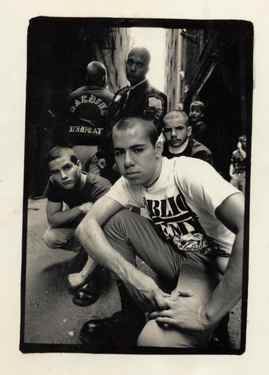persimokius, persidirbus, galvojant apie ateities planus ir nesibaigiancius mokslus, biski vilties ipucia, kad yra zmoniu kuriems panasus klausimai kyla ir kurie siulo bent siokiu tokiu konkreciu budu kaip su visu 'laiko neturejimo' reikalu tvarkytis.
Social-Justice Activism in the Academic Industrial Complex
Andrea Smith
The theme of these "Got Life?" essays begs the question: How did "having a life" become constructed as something at odds with having a job in academia? Why has being a good scholar and academic come to mean that one should be working incessantly at the expense of doing social-justice work, having fun, or maintaining interests outside academia? It is not sufficient to ask, How can we lead lives that are more balanced? Or, How can we balance a life of social-justice activism with a job in academia? Rather, we must deconstruct the logic of the academic industrial complex to see how it has trapped us into needlessly thinking we must choose between academia and having a life.
Louis Althusser argued that educational systems are an "ideological state apparatus" by which the capitalist system reproduces itself ideologically.1 "Education" is not innocent or neutral, it is designed to teach peoples to be subject to colonial and capitalist structures. Similarly, as Pierre Bourdieu elaborates, dominating classes assure their position through not only domination over economic capital but over cultural capital, a form of domination that enables them to secure the terms of discourse and knowledge to their benefit. The educational system is particularly important in the reproduction of symbolic capital under capitalism. The standardization of academic qualifications—a given amount of labor and time in academic apprenticeship is exchanged for a given amount of cultural capital, the degree—enables a differentiation in power ascribed to permanent positions in society and hence to the biological agents who inhabit these positions. According to Bourdieu, what is significant about the educational system is not just the set of ideologies it promotes, but the set of tacitly unequal institutional power relations it ensures through the fiction of equal access to education.2 However, in order to function as an ideological state apparatus, the academy must disavow its complicity in capitalism by claiming itself as a meritocratic system. That is, only those academics who are smart and work hard will succeed. Even progressives within the academy tend to perpetuate this myth of meritocracy by their refusal to see academia as a game whose rules anyone can learn to play strategically. Otherwise, if one appears not to be working endlessly for the academic industrial complex, that person will be condemned as being a lazy or undeserving scholar. I, for instance, have been told on innumerable occasions that if I have time to do as much activist work as I do, then I must not really being doing scholarship. But if we do support social justice, then we should be demystifying the academy rather than perpetuating its capitalist logics. The reality is that one does not have to work tirelessly to be successful in the academy. Rather than always feeling compelled to promote the appearance of busyness in our lives, we should demystify the academy and share strategies of how to manage it effectively. Below are some survival strategies I have learned that have enabled me to continue my social-justice organizing while employed in the academy in order to contribute to this necessary conversation.
1. Understand intellectual work as collaborative. A phenomenon that results from academia's myth of meritocracy is that scholars feel an undue burden to prove their brilliance. They can never take short cuts. They cannot publish anything unless it is perfect. Consequently, it takes many scholars an inordinate amount of time to finish their work because they suffer from excessive anxiety attacks as to whether or not their contributions are going to be sufficiently brilliant to warrant their publication. In addition, the capitalist logic of the academic industrial complex promotes extreme intellectual individualism. If one were to seek help from others, it would mean that person is intellectually inferior. In reality, however, all intellectual production is collaborative. Thus, we should unashamedly seek intellectual partners and collaborators in doing our work. If you have a hard time organizing your thoughts, then find someone who will help your organize them. Meanwhile, you may be a good copy editor who can help someone who needs this skill. In addition, our contribution should also be seen as part of a larger collaborative intellectual project whereby our goal is not to prove our own brilliance, but rather to perpetuate a conversation that will continue beyond our contribution. If years from now no one remembers what we said, then we will have still done important work if we did our part to keep the larger conversation going.
2. Manage time strategically. The myth of meritocracy tells us that everything we do in academia needs to be done equally well. Trying to do everything equally well ensures that we will have a nervous breakdown in ten years and that we will probably not do the work we really needed to do well, as well as we should have anyway. For example, your tenure book has to be done well, but the three-page report you write for one of the committees you are on does not necessarily require that much time. Every minute you spend writing a committee report that almost no one will read is one less minute you are spending on your book. I have seen colleagues obsess over writing internal funding requests for university programming that the funding sources barely even read. I have also seen colleagues organize conferences in which they spend months obsessing on the text for the call for proposals, and then do not get the calls out in time for anyone to attend the conference. To get through academia, one must look at the whole picture and decide which tasks are most important and which are not, and then distribute one's labor accordingly.
3. Think beyond the nonprofit and the academic industrial complexes when doing social-justice organizing while working in the academy. Just as the academic industrial complex tells us we must devote our lives to the academy, so too does the nonprofit industrial complex (NPIC) tell us that activism is a full-time career.3 A significant problem for anyone doing organizing work is that many of the social-justice movements in the United States happen out of the context of the nonprofit industrial complex. Activists and organizers often have difficulty conceiving of developing organizing structures outside this model. At the same time, however, social-justice organizations across the country are critically rethinking their investment in the 501(c)(3) system. Particularly with funding cuts from foundations as a result of the current economic crisis, as well as increased surveillance on social-justice groups through "homeland security," social-justice organizations are assessing if there are other possibilities for funding social change that do not rely so heavily upon state structures. As Dylan Rodriguez notes in The Revolution Will Not Be Funded, the nonprofit industrial complex is the set of symbiotic relationships that links together political and financial technologies of state and owning-class control and surveillance over public political ideology, including and especially emergent progressive and leftist social movements. He argues that the NPIC is the natural corollary to the prison industrial complex (PIC) in that while the PIC overtly represses dissent, the NPIC manages and controls dissent through incorporating dissenters into the state apparatus.4
The NPIC thus contributes to a mode of organizing that is ultimately unsustainable. That is, in order to change society radically, we must build mass movements that can topple current capitalist hierarchy. But the NPIC encourages us to think of social-justice organizing as a career—that is, you do the work if you can get paid for it. However, a mass movement requires the involvement of millions of people, most of whom cannot get paid to do the work. By trying to do grassroots organizing through this careerist model, we are essentially asking a few people to work more than full time to make up for the work that millions of people need to do.
It is important to look outside the United States for alternatives models for social change. In other countries, such as India or those in Latin America, social movements are not necessarily dominated by nonprofits. Rather, constituents fund movement building. These movements may make alliances with nonprofits or they may develop their own nonprofits as intermediaries to fund specific aspects of their work. But these nonprofits are accountable to social movements; they are not seen as being part of the movement themselves. Furthermore, if this kind of nonprofit is defunded, it does not significantly impact the movement because constituents are the main sources of the movement's funding.
Consequently, these organizing models rely on people's ability to integrate organizing into their everyday lives rather than to articulate organizing as a career vocation. Thus, while everyone may not be able to spend twenty hours per week on top of their paid job to do organizing work, they can probably spend one hour per week—and if millions of people all contributed one hour per week to political organizing, we could challenge the system significantly. I am not arguing that teaching or simply doing research is activism and organizing in itself. Activism and organizing by definition must be collective. It is only through collective action that real change can take place. Furthermore, organizing entails not only working with like-minded activists but also building movements that attract people who aren't already activists in order to build the people power necessary to radically change current economic and political structures. Everyone has a responsibility to be part of social movement building. Academics give one of several excuses as to why they cannot engage in collective engagement, all of which are indicative of the extent to which academics become unconsciously (or consciously) loyal to the current capitalist system. Academics will often say, for instance, that they are "too busy" to do activist work. The reality, however, is that everyone is "too busy" for organizing. If we were to build mass movements around those who are not busy, we would have three people to do the work. So, the assumption behind this excuse is that academics should have some kind of special dispensation from activist work. But why should academics be any less responsible for taking part in activist work than florists, garbage collectors, or beekeepers? The assumption that academics should have some special dispensation suggests an investment in social elitism that would hold academics in a special category from other workers of the world.
However, while we all need to be part of building movements, we can do so outside the career-activist model promoted by the nonprofit industrial complex. Instead, we can build new social movements in the United States, where our organizing becomes part of our lives rather than something we put our lives on hold to do. We can always be looking for strategic ways to make our work directly accountable to movements for social change.
It is interesting to me how many progressive and leftist scholars one can find in the academy, and yet so few of them actually challenge the terms of the debate within the academic system. Progressives who turn a critical eye to all the other institutions in society often seem unwittingly to assume that the academy is either a neutral or benevolent institution that simply needs personnel changes or different policies and procedures. Because the actual structure of the academy goes unquestioned—from tenure processes to grading systems to academic hierarchies—even progressives get trapped in the academy's meritocratic myth, which either makes them insane or turns them into fascists. All the collective action we support outside the academy seems to disappear inside it—as we slave away in our offices in order to make sure everyone knows how busy and hardworking we are. Instead, we could be working together to support each other, build community, demystify the academic industrial complex, swap survival strategies, and promote life for all of us.
1. Louis Althusser, "Ideology and Ideological State Apparatuses (Notes towards an Investigation)," in Lenin and Philosophy and Other Essays, trans. Ben Brewster (New York: Monthly Review Press, 1971), available in full text at http://www.marx2mao.com/Other/LPOE70ii.html#s5 (accessed July 8, 2007).
2. See, for example, Pierre Bourdieu and Jean-Claude Passeron, Reproduction in Education, Society, and Culture, trans. Richard Nice (1970; reprint, London: Sage, 1990).
3. For a more sustained critique of the nonprofit industrial complex, see The Revolution Will Not Be Funded: Beyond the Nonprofit Industrial Complex, ed. Incite! Women of Color against Violence (Boston: South End Press, 2007).
4. Dylan Rodriguez, "The Political Logic of the Non-profit Industrial Complex," in ibid.




